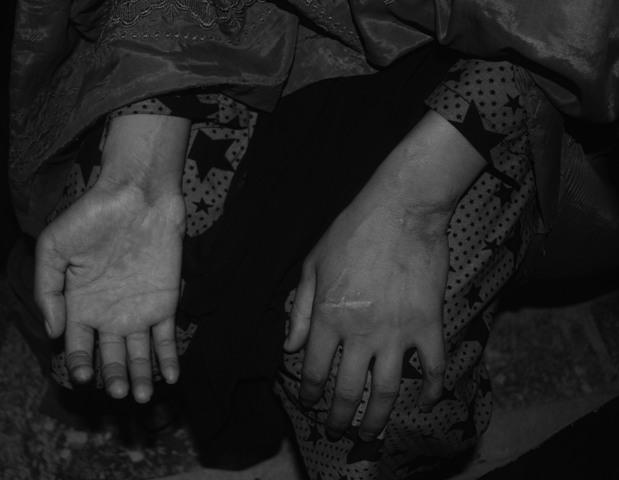KABUL (Pajhwok): A victim of forced marriage, after eight years of suffering at the hands of her spouse, has been forced into fleeing her home and seeking refuge in a safe home.
In some parts of Afghanistan, parents marry off their daughters for resolving societal and family disputes (baad), reducing dowry, (badal) or for repaying debts. However, few are aware that this too could constitute a form of trafficking in persons, as defined by Afghan law, as it often involves the use of force, coercion, power and deception and exploitation.
Sakina, 22, currently living in a Kabul safe home along with her 16-month-old son, told Pajhwok Afghan News she was forcibly married at 14 years of age to a 35-year-old man eight years ago by her parents.
The young woman, apparently exhausted and unhappy, said: “We enjoyed a good married life for three years. We had a child and separated from in-laws in line with the desire of Naser, her husband. We came to Kabul and lived with Naser’s relatives here.”
But her trip to Kabul marked the beginning of her misfortunes and misery. She said the son of Naser’s neighbour was a drug addict. Thus her husband also started consuming drugs.
“My husband would do drugs in a corner of the house. As he started visiting the neighbours, Naser developed illicit relations with a girl in that family,” said Sakina (an assumed name).
After seven year of marriage, she gave birth to four children. “I shared the problem with my mother-in-law but the issue persisted. My mother-in-law accepted me along with my kids. Later on, Naser fled to Mazar-i-Sharif with the girl he had immoral ties with.”
“Along with the girl he had married, my husband returned from Mazar-i-Sharif after three months. But he still consumed drugs. He threw me from the second storey of the house. My leg was broken. Then he set the house alight.”
Sakina claimed she had no option but to part her ways with Naser and sought help from the Human Rights Commission in this regard. As suggested by the commission, she started living again with Naser.
Despite her efforts for reconciliation and bringing Naser back to normal life, the man continue with his violent approach — something that forced Sakina to leave her home 11 months back.
Uncertain future
A safe home official said Sakina came there nine months earlier from Mazar-i-Sharif. Her case is being investigated, with her husband admitted to a drug rehabilitation centre in Kabul.
The lawyer pleading Sakina’s case says no breakthrough has been achieved so far. Further investigations will happen after her husband is discharged from hospital.
Forced marriages a primitive traditions and criminal activity – TiP High Commission
Nazia Faizi, a member of the commission dealing with the human trafficking at the Ministry of Women Affairs, called Sakina’s story painful and said it was necessary the issue is investigated properly.
She confirmed girls’ consent was not sought before they were engaged — a key reason behind growing incidents of running away from homes by married women. She linked forced marriages to primitive traditions that still existed in rural areas.
Faizi lamented many underage girls were married illegally. She said all that happened to Sakina — marriage before 16 years of age, violence and other atrocities — were criminal activities under Article 5 of the Violence Against Women law.
Underage marriages a criminal offence – Ministry of Justice
Abdul Majid Ghanizada, a senior official at the Ministry of Justice, said fleeing home for fear of being killed or other threats was a legal right of every individual.
He added according to the Violence Against Women law, anyone marrying a girl under 16 can be punished with imprisonment and his nikah or engagement would be revoked.
Islam abhors violence against women – Religious leader
Renowned religious scholar Shamsur Rahman Frotan said violence against women, beating or insulting them and having illicit relations with them as embarrassing activities that were prohibited in Islam.
He justified Sakina’s decision to leave her home, saying she had fled to rescue herself — something allowed by Islam. She can seek divorce if justice is not done to her.
The religious scholar pointed out that it is not just the government and CSOs that have a role to play in helping women like Sakina resume normal life again. Families and communities must also be prepared to accept survivors of trafficking and give them a chance as well as ensure that women and girls in Afghanistan do not face the domestic violence and exploitation and suffering due to cultural form of human trafficking that Sakina had gone through.
Visits: 54









GET IN TOUCH
NEWSLETTER
SUGGEST A STORY
PAJHWOK MOBILE APP